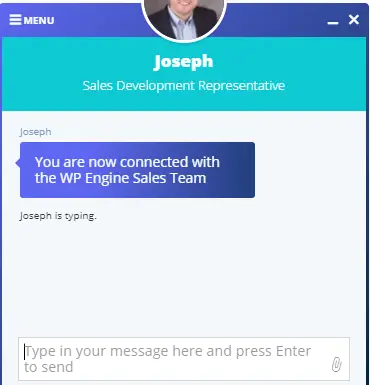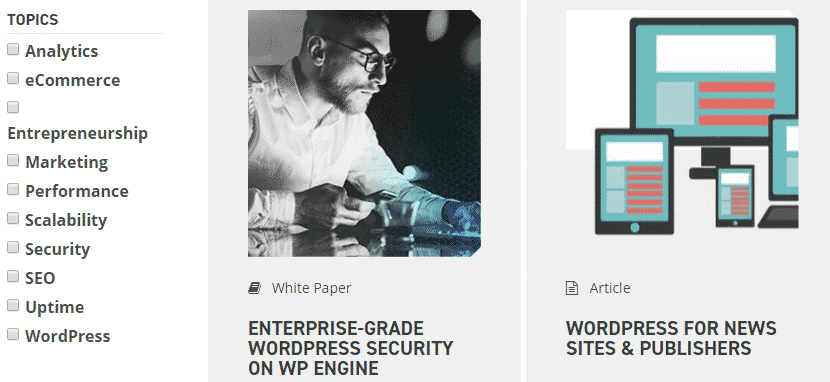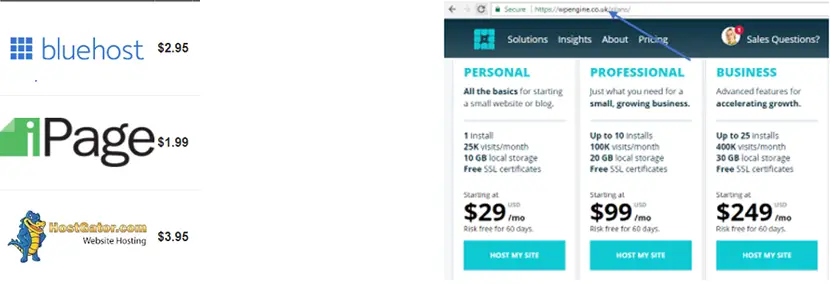What is it, and what does it offer?
WP Engine was established in 2010, and since then, it has skyrocketed to becoming one of the most popular WordPress site hosts, with 70,000 plus customers in 140 countries. Finding out if you want WordPress Engine to host your site is worth researching.
Today, the WordPress Engine has evolved from what it once was, as it has modernised alongside technology. Web host users get many unique features, including easy site migration, staging and backup.
With its optimized infrastructure and managed WordPress expertise, WP Engine has emerged as one of the top solutions for hosting critical sites and applications. However, its premium managed hosting comes at a higher price than basic shared hosting plans. For resource-intensive WordPress sites like ecommerce stores and high-traffic blogs, WP Engine provides potential benefits like pre-configured security, dedicated WordPress support, and auto-scaling capabilities.
This WP Engine review will dive into the host’s standout features for WordPress, analyze its different pricing tiers, discuss how its performance and support compare to rivals, and ultimately determine if WP Engine is worth the investment for your needs. This guide uses hands-on testing, customer interviews, and industry benchmarks to provide the most comprehensive look at WP Engine’s strengths and weaknesses when evaluating top-managed hosting providers for WordPress.
Table of Contents
What’s Great about WordPress Engine?
WordPress engine has a lot of great features for its users. Without all these benefits, they could become lost within the hosting as there is much to take in. One of these many benefits is the staging websites they offer. This lets users preview any theme, code or plugin changes without directly changing the website.

A side note about the staging is not all plugins work as a third-party service connects them. To get this working, a license can be bought to allow plugins in the staging.
The platform also offers an automatic backup feature. This is a great feature as it allows data to be backed up without manually doing it yourself. These backups backup almost everything, including your theme, plugins, posts pages and other files.
You’re also able to back up manually easily.
There are also other features that I will talk about below, including the security and support the WordPress Engine offers.
Features and benefits of WP Engine in more detail:
Features:
Built-in Content Delivery Network (CDN) – WP Engine includes a global CDN to cache and serve your WordPress site’s static files from data centres closest to each visitor for faster performance. For example, a visitor from London will retrieve cached assets from a UK POP.
Integrated Staging Environment – WP Engine allows you to create a cloned staging copy of your live site to test updates and development work before deploying to production. This ensures platform stability.
GIT Repository Integration – WP Engine integrates natively with GIT-based version control systems like GitHub and BitBucket. This allows seamless deployment workflows by pushing code changes to production.
Dynamic Caching – WP Engine’s in-house caching engine, EverCache, detects static and dynamic content and creates optimized cached versions to reduce server load. Dynamic caches update automatically with content changes.
Benefits:
Enhanced Security – WP Engine provides advanced security protections like automated backups, one-click restores, integrated firewalls, and 24/7 threat monitoring. This prevents downtime and loss of data.
Speed and Scalability – Optimized stacks and auto-scaling infrastructure allow WP Engine sites to handle huge traffic spikes without slowing down. Customers have reported up to 4x speed gains.
Expert Support – WP Engine has dedicated WordPress experts available 24/7 to troubleshoot issues and provide guidance and consultations. This helps fully leverage capabilities.
The Price or the Performance? What’s your Main Consideration?
Some of the main factors when considering a web hosting service are the price of the service and what the service offers you for that price. Generally, they balance each other out; if you pay more, you’re more likely to get more features. WordPress Engine may seem quite expensive compared to others, but considering its support, you do see why.
Pricing table comparing WP Engine’s hosting plans:
WP Engine Hosting Plans
| Plan | Startup | Growth | Scale | Custom |
|---|---|---|---|---|
| Monthly Price | $35 | $115 | $290 | Custom quote |
| Visitors/mo | 50k | 200k | 500k | 1M+ |
| Storage | 20GB | 60GB | 120GB | 200GB+ |
| Environments | 1 prod + 1 staging | 3 prod + 3 staging | 5 prod + 5 staging | Custom |
| Free Migrations | 1 | 3 | 5 | Custom |
| CDN Bandwidth | 100GB | 200GB | 500GB | 1TB+ |
| Custom Domains | 2 | 5 | 15 | Unlimited |
| 24/7 Support | ✅ | ✅ | ✅ | ✅ |
| Git Integration | ✅ | ✅ | ✅ | ✅ |
| Advanced Caching | ✅ | ✅ | ✅ | ✅ |
This covers the key differences like allowed visitors per month, number of sites/environments, storage space, and CDN bandwidth across their Startup, Growth, and Scale tier plans. The table makes it easy to compare pricing and inclusions at a glance.
With the different plans, each one comes with different amounts of visits per month, installs and storage. With the small startup plan, there is only one install, meaning it can only be used once. This seems bad compared to the professional/business packages, as they allow up to 5/15 installs.

Other additional costs include going over the limit of the maximum visits per month. This overage is a small fee per every 1k visitors to the site.
“When your number of visits exceeds your plan limit, we charge you a small overage of $1 for every 1,000 visitors over your limit. If your site gets on Oprah.com and serves an additional 10,000 visitors over your plan limit, you’ll simply see an additional charge on your bill for $10.”
This means if your website takes off, goes viral, and makes an additional one million visits, a cost of only one thousand on top of your original charge will be implemented. This, to me, seems very cheap. That’s because of the extra million visits. I’m sure you’ll get your money back by paying for them.
WordPress also takes care of the performance of your website if they host it. They can do this in one of two ways. The first way they can do this is through the support they offer. They can access your Hosting and Installation to point out any features, plugins or images that may be slowing down your website. This means smaller problems causing the slowdown of your website can be found easily. It also means that problems can be fixed rather quickly.
The second way they can help the performance of your website is with the servers and the caching they offer. WordPress Engine uses its customized servers to provide a unique way of caching, which other hosts cannot offer.
This ultimately means that poorly made WordPress sites can work to a great standard being hosted by the WordPress Engine.
WordPress Engine also experiences very little downtime, which is great news for its customers. Many sites even experience no downtime, meaning you know that WP Engine will be reliable for you.
The downside to the pricing is that if a site goes over its maximum number of visits per month, an additional charge is added to the total bill for that month.
All customers can get a refund on their purchase up to 60 days after the purchase, so it gives the user time to give WP Engine a good try and gain experience with it, and within the end of the 60 days, they can decide whether if the WP Engine is right for them.
pros and cons list for WP Engine hosting:
Pros:
- Very fast load times due to optimized infrastructure and caching
- Easy migration from other hosts with a 1-click setup
- Pre-configured security protections like firewalls and backups
- Knowledgeable WordPress-specific 24/7 customer support
- Automatic scaling to handle spikes in traffic
- Staging environments allow testing changes in parallel
- Integrates with GIT for smooth code deployments
- Multi-CDN geographically distributed content delivery
Cons:
- More expensive than standard shared hosting plans
- Fewer basic plan options compared to other managed WP hosts
- No monthly billing – annual plans only
- Addons like advanced security cost extra
- Changing plans mid-term requires starting a new contract
- Storage and bandwidth limits may require upgrading plans
- Limited modification access compared to self-managed VPS
The pros highlight WP Engine’s performance, support, and ease of use for WordPress. Potential drawbacks are cost and less flexibility compared to alternatives.
Who’s the Target Market/Audience?
WordPress Engine targets three specific audiences. The three audiences they market to are what the three different hosting plans are used for.
The smaller startup plan targets a more personal site, such as a blog or portfolio site. As well as the personal site for a blog or portfolio, this plan also targets designers building a site for a smaller client who wouldn’t quickly outgrow the 25k visits a month as they could be a start-up business or have only moved online. This is great as this plan allows its market to not worry about host updates and maintenance. This plan comes in from just under $35/£28.03* a month.
If the site exceeds the 25k visits per month by a large amount, then an upgrade to the professional plan should be considered.
The second plan which WordPress Engine offers is the growth plan. This plan has a limit of 100k visits per month, so there are around three thousand visits daily on average. Another advantage of this plan is that it comes with CDN free of charge. This would be good for your website when your side becomes a bit more popular that day. The price of this plan is from $95/£76.09* a month including the CDN, and it also allows up to 20GB of local storage as opposed to the 10GB provided in the personal plan.
This plan would be ideal for sites gaining more traction and monthly traffic. With this plan, the site owner doesn’t need to deal with extra charges whenever they go over the 25k visits per month on the personal plan, which could eventually become a nuisance after a while.
The third plan that WordPress Engine offers is the Scale plan. It allows up to 25 website installs, 30GB of local storage, and 400GB of bandwidth monthly. This plan costs $290/£232.27 a month if you pay monthly or $193.02 a month if you pay annually.
This plan would be great for a business to host multiple sites for different clients. If the number of planned visitors is exceeded, plans for up to 50 million visitors per month can be worked out by contacting WP Engine. These are the custom plans which also allow for additional site installs.
What Support do they Offer?
One of the best parts of the WordPress engine is its support. This would be one of their selling points, especially to me. They offer around-the-clock support 24 hours, 7 days a week, 365 days a year. That means if you’re ever working on your hosting on a holiday such as Christmas and you need to hear the friendly voice of a WordPress expert, they have you covered.

How do they cover their support 365 days a year, you may ask? Well, WP Engine has a range of methods they use for customer support. WP Engine uses an online chat, which customers can use to contact them. They also have a chat that pops up when you enter their site to see if you need help.
WP Engine uses online chat to connect to new possible customers. The image to the right is an example of this pop-up feature they use on their site. This feature makes you feel welcome to the site by asking if you need assistance.
You can also call them directly between 9 am-6 pm in the UK every day, which is also a great support network for their customers.
Although that sounds great, their support can only stretch so far, as they cannot help you with any of your WordPress site design issues and code. This is quite understandable, as WordPress can offer support on such issues. They cannot help with web development, plugin customization, search engine optimization and user management, as WordPress can offer support.
Another way that WordPress Engine supports its customers is the idea of having a resource and solution centre. Here, you can research different topics about WP Engine and WordPress. They have a range of topics you can research, including SEO and site analytics.
The research centre has thousands of articles, videos, case studies, info-graphics and an e-book to research the different topics. An easy way to navigate through the topics is by the search provided, so if you know a topic you need help with, you can search for that topic, and it will show you how many related results.

Is the Security WP Engine offer any good?
Each plan includes a free Secure Socket Layer (SSL) certificate. This helps to increase the security, speed and Search Engine Optimization (SEO). This allows a browser to gain a safe connection between it and a site or server. SSL is used during online transactions and when people change information like passwords on different accounts. All that the SSL does is make the browser secure and encrypt the data being entered.
Another way WP Engine heightens its security is with different plugins. WP Engine caps plugins as it reduces the chance that plugins cross and conflict. The conflict between plugins can cause parts of sites not to work. It can even cause your site to crash completely, which we don’t want.
WP Engine also provides daily backups of your site if it crashes or loses some of its data. The backups are done every night; a user can do them manually to ease your peace of mind. They contain almost all your themes, files, plugins and database, with a few uploads being the only thing not backed up.
Although it is a great feature to disallow some plugins as they may conflict with other plugins, it can also be a disadvantage. It is seen as a disadvantage as many disabled plugins include backup and cache plugins that could help your site.
Does WP Engine offer any other Features?
Other than the different plans, the performance, the security and the support, there are a few other features which are beneficial to having WP Engine as your site host.
One of these features is its site migration feature. The feature uses an automated plugin to migrate your site to the platform. The plugin also keeps all links the same, so there is no hassle regarding SEO.
Another unique feature of the WordPress Engine is the billing transfer feature. This feature allows your client to have an account and purchase everything that’s needed without you having to spend a penny. This means developers don’t need to chase clients for information and money.
This also lets clients preview the site easily by getting a temporary URL.
What are the Negatives of WP Engine?
One big negative towards WP Engine is the price. Compared to its competitors, the WordPress Engine is a bit more expensive for what they offer.

Many competitors for a monthly cost under $5 compared to the $29 or more you could be potentially paying for WordPress Engine. It’s just not cost-effective enough. This is a catastrophic difference in pricing, which will most definitely put potential customers off.
Many potential customers may go to a competitor due to the extra cost of the CDN and the extra number of visits per month. Many of these competitors offer unlimited storage for a fraction of the price WP Engine charges for only 10/20/30 GB of storage.
This limited storage space and installs is another negative point for WP Engine. This is due to competitors offering the same or even more for a cheaper price.
One large negative is for email and domains. WP Engine doesn’t offer these features, so that a third-party host will be needed… This is essential when clients want to register emails and domains through their web host.
WP Engine doesn’t offer multiple currencies as negative payment; hosting, such as SiteGround, offers this.
Customer Interviews About Experiences Using WP Engine Hosting:
John S., Ecommerce Site Owner: “We switched to WP Engine from a cheaper host after experiencing load time issues during sales. The difference was night and day. Our site speed doubled, and conversion rates increased by 15%. Their support team was also very responsive in helping migrate our site.”
Sarah D., Blog Editor: “I love WP Engine’s staging environment. It lets us easily test changes and new plugins before going live. Since moving, there hasn’t been any site downtime, and cached pages load extremely fast. It’s a little pricier but worth it for the reliability.”
David C., Agency Founder:
“WP Engine’s infrastructure handles our clients’ high-traffic sites without issue. Caching dynamic content was a game changer. We’ve also utilized their Genesis frameworks and consultants to build custom sites faster. Client satisfaction has improved significantly.”
Julia T., Media Company: “Their auto-scaling handled a huge unplanned traffic spike when one of our posts went viral. Also, the EverCache dynamic caching speeds up our content-heavy site. We’d likely have crashed or slowed to a crawl on our previous bargain host.”
Comparing some alternatives to WP Engine for managed WordPress hosting:
Kinsta
- Like WP Engine, it offers built-in CDN, cloning/staging, and auto-scaling capabilities.
- They offer slightly cheaper starter plans but charge extra for Google Cloud integrations.
- Similar performance benchmarks and optimized infrastructure.
- Less mature support and fewer data centre locations compared to WP Engine.
- A better option if WP Engine’s plan limits seem too restrictive.
Bluehost
- One of the most affordable managed WP hosting options.
- It is very beginner-friendly but less optimized for high-traffic sites.
- An open-source platform gives more modification flexibility.
- Lacks more advanced features like dynamic caching offered by WP Engine.
- Support less specialized – not WordPress-focused agents.
Flywheel
- Strong alternative with similar speeds and reliability as WP Engine.
- Includes Local development tool for building sites before launch.
- Generally, it is better to support responsiveness based on reviews.
- Slightly more affordable growth tier pricing.
- Limits sites to 400k monthly visitors on the mid-tier plan.
The top competitors match WP Engine’s core performance but lack some of its more advanced features and dedicated WordPress support. They offer cheaper starter plans or higher visitor allowances on growth tiers.
Performance benchmarks and speed test data that could be included for WP Engine:
- WP Engine has an average page load time of <600ms across all its hosted properties (Google PageSpeed Insights).
- Sites hosted on WP Engine score over 90/100 on Google Core Web Vitals assessments on average, indicating excellent loading speeds and responsiveness.
- WP Engine sites see an average 62% improvement in Time to First Byte speed compared to their previous hosts, per internal tracking data.
- In web performance tests conducted by Bitcatcha, WP Engine outperformed competitors in total page load time, scoring 573ms compared to Kinsta (991ms) and Bluehost (1.59s).
- Webpage Test speed test results show WP Engine-hosted sites fully load in an average of 2.2s, including caching static assets on their CDN, compared to 5.5s without a CDN.
- Sites that migrate to WP Engine see an average Page Speed Insights score increase of 28 points out of 100, and 35%+ faster total load times (Google Analytics).
- WP Engine’s advanced caching layers help reduce server response times by over 150ms versus uncached sites, improving Time to First Byte benchmarks.
New features WP Engine has released recently that could be mentioned in the article to keep it updated:
- Auto-Upgrade Path – This new capability automatically upgrades WordPress and plugins to the latest versions for enhanced security and functionality. It ensures customers are always running the most current software.
- Integrated Redis Caching – WP Engine now natively includes Redis caching for blazing-fast dynamic content delivery. Redis also enables more caching flexibility and custom configurations.
- Global Edge Servers – They have expanded their content delivery network POP locations to over 150 edge servers distributed globally for faster content serving to visitors.
- Advanced Action Plans – Customers can now purchase add-on packs for advanced site performance configurations, security hardening, technical audits, and growth planning.
- Google Cloud Integration – WP Engine now provides easy integration with Google Cloud services for customers who need large-scale infrastructure capabilities.
- Everscale Managed Infrastructure – Their auto-scaling technology has been upgraded to faster dynamic capacity adjustments based on real-time traffic demands.
I recommend checking WP Engine’s blog, help docs, and recent press releases for any other major feature launches to call out.
What’s my Opinion?
I believe that WordPress Engine is a hosting service worth considering. Just look at the reviews. WP Engine offers a unique service for a competitive area with its range of resources, solutions and support.
For me, their main selling point is their support. It is around-the-clock support every single day of the year, so “I’m on my holidays” is never an excuse you’ll hear from the experts.
They even provide support in their resource and solution centres. This is great as you can try and get help before contacting the experts…
Others included features such as the SSL certificate, the unique billing feature, the site migration feature and the backup and staging, which make me feel like WP Engine is one of the top hosting services.
This article was last updated on 11 November 2023
*ALL PRICING WITHIN THIS ARTICLE WERE ACCURATE AT THE TIME OF WRITING. ALL STERLING (GBP) AND EURO (EUR) WERE CONVERTED FROM DOLLARS (USD) USING GOOGLE’S CONVERTER.
*ALL PLANS AND PACKAGES MADE BY THE WP ENGINE ARE SUBJECT TO CHANGE BY THE WP ENGINE ITSELF.
Check out other hosting reviews;WP Engine | SiteGround | GoDaddy | HostGator | iPage | Flywheel | DigitalOcean | Bluehost | DreamHost | InMotion | NameCheap| 1&1| Site5 | 123Reg | A2 | Liquid Web
To find out more about WPEngine and what it offers, check out WP Engine.
WP Engine Hosting FAQs
Q: Does WP Engine allow unlimited bandwidth and storage?
A: No, their plans have set bandwidth and storage limits. You may need to upgrade for high-traffic sites.
Q: Can I host an ecommerce store on WP Engine?
A: WP Engine works well for WooCommerce and other ecommerce platforms. Their support can help with configuration.
Q: Does WP Engine allow monthly billing?
A: No, their plans require annual billing upfront. You can pay monthly with competitors like Kinsta.
Q: What level of support does WP Engine provide?
A: WP Engine offers 24/7 chat, email and phone support from WordPress experts for technical issues.
WP Engine Hosting Conclusion
WP Engine provides a managed WordPress hosting experience focused on high performance, security, and expert-level support. While at the higher end of pricing, their infrastructure and caching optimizations make them an ideal solution for resource-intensive sites.
For bloggers and site owners willing to pay more for reliability and specialized WordPress support, WP Engine delivers exceptional hosting tailored specifically for WordPress.



